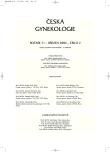-
Medical journals
- Career
Inhibin B and Intraacrosomal Proteins in Men from the Couples with Fertility Disorders
Authors: K. Babčová 1; Z. Ulčovágallová 1; Z. Červenková 1; J. Pěknicová 2; P. Panzner 3; Z. Mičanová 1; K. Bibková 1; Z. Rokyta 1
Authors‘ workplace: Gynekologicko-porodnická klinika LF UK a FN, Plzeň, přednosta doc. MUDr. Z. Rokyta, CSc. 1; Ústav molekulární genetiky AV ČR, Praha, vedoucí ústavu prof. RNDr. V. Pačes, DrSc. 2; Ústav klinické imunologie a alergologie, LF UK a FN, Plzeň, přednosta doc. MUDr. P. Panzner, CSc. 3
Published in: Ceska Gynekol 2006; 71(2): 111-117
Category: Original Article
Overview
The aim:
To monitor the basic andrologic and immunologic sperm factors and the levels of inhibin B in serum and in seminal plasma in men from the couples with infertility disorders.Setting:
Department of Gynecology and Obstetrics, Medical School, Charles University and University Hospital, Plzen, Institute of Molecular Genetics, AV CR, Prague, Institute of Clinical Immunology and Allergology, LF UK a FN, Plzeň.Methods:
We used conventional methods for estimation of sperm quality according to WHO and we detected the intra-acrosomal proteins by monoclonal antibodies (Hs8 and Hs14, immunofluorescent method), spermantibodies by direct mixed antiimunoglobulin reaction (MAR) test, and we examined inhibin B in serum (≤400 pg/ml= A) and in seminal plasma (≤ 600 pg/ml= N) by ELISA in 355 men aged 21-52 years (∅ 34 years) with normal levels of FSH, LH and testosterone. The control group was created by 56 health sperm donors.Results:
We found 65% normospermatics in the group of 355 patients, 34.9% men with various kind of pathologies. Predominance of spermagglutinating antibodies was found in 15.77% in IgG, in 19.44% in IgA, in 8.44% in IgA and IgG together. Normal intraacrosomal proteins were reached in 74.65% for Hs8, in 20.85% pathologic, in 86.2% normal findings for Hs14, in 4.23% pathologic. The immunological results in control group were completaly negative. Pathological levels of inhibin B in seminal plasma was found in 37.2% (152 men), in 2.5 % in serum, and in 5.6% in serum and in seminal plasma together. In 54.7% of patients we found physiological levels of inhibin B in both biological fluids. We also compared physiological 109/152 (71.71%), and pathological spermiogrammes 43/152 (28.29%) with abnormal levels of inhibin B in seminal plasma, with intraacrosomal proteins to levels of inhibin B in serum. Our detailed study shows high interidividual results, which must be studied in complex with diagnosis of decreased fertility in man.Conclusion:
Andrologic and immunologic analysis in the group of 355 men showed normal parameters of spermiogrammes in 231 patients (65%), in the rest of men the immunologic profil was in various parts pathologic. Only 105 men have got excellent spermiogrammes. Inhibin B as hormon regulates in back the secretion of FSH, and serves as good indicator in male reproductive failures.Key words:
inhibin B, intraacrosomal proteins, fertility disorders
Labels
Paediatric gynaecology Gynaecology and obstetrics Reproduction medicine
Article was published inCzech Gynaecology

2006 Issue 2-
All articles in this issue
- Analysis of Stagnation of Perinatal Mortality in the Czech Republic
- Ursodeoxycholic Acid, S-adenosyl-L-methionine and their Combinations in the Treatment of Gestational Intrahepatic Cholestasis (ICP)
- Hematological Aspects of Gestational Cholestatic Hepatosis (ICP)
- Doula – a New Model of Delivery (continuous, nonprofessional care during the delivery)
- Embryo Quality Evaluation According to the Speed of the first Cleavage after Conventional IVF
- Inhibin B and Intraacrosomal Proteins in Men from the Couples with Fertility Disorders
- Prenatal Detection of Congenital Mezoblastic Nephroma
- Radical Parametrectomy in Women with Invasive Cervix Cancer after Previous Simple Hysterectomy
- Antibodies against the Chlamydial Heat Shock Protein in Women with Periadnexal Adhesions
- Serum Amyloid A as an Effective Marker for the Assessment of Surgical Trauma and Risk of Post-operative Complications
- Syndrome of Persistent Low Levels of Human Chorionic Gonadotrophin (hCG)
- New Method for Detection of Nonpalpable Breast Cancer
- Possibilities to Use the Aromatase Inhibitors for the Treatment of the Uterine Fibroids
- Czech Gynaecology
- Journal archive
- Current issue
- Online only
- About the journal
Most read in this issue- Embryo Quality Evaluation According to the Speed of the first Cleavage after Conventional IVF
- Serum Amyloid A as an Effective Marker for the Assessment of Surgical Trauma and Risk of Post-operative Complications
- Radical Parametrectomy in Women with Invasive Cervix Cancer after Previous Simple Hysterectomy
- Ursodeoxycholic Acid, S-adenosyl-L-methionine and their Combinations in the Treatment of Gestational Intrahepatic Cholestasis (ICP)
Login#ADS_BOTTOM_SCRIPTS#Forgotten passwordEnter the email address that you registered with. We will send you instructions on how to set a new password.
- Career

